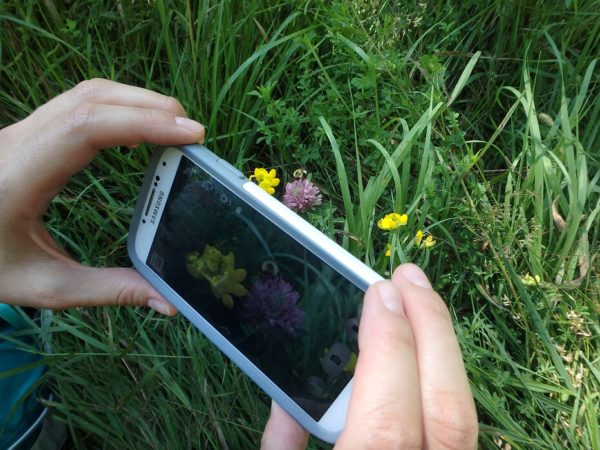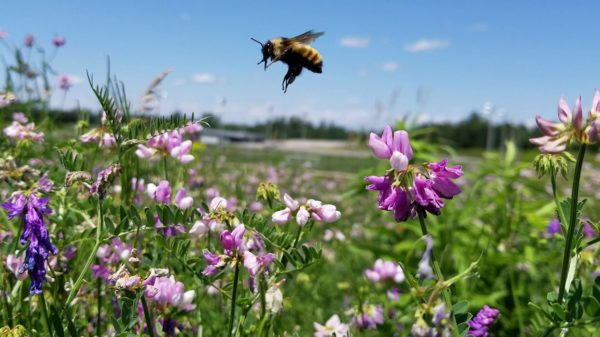TORONTO, May 12, 2020 – How valuable is community science to research? A survey of participants at Bumble Bee Watch, a community and research collaboration to track and conserve bumble bees in North America, found users are well educated and strongly motivated to save bees, say York University researchers.
Bumble Bee Watch is a community science program where participants submit photos of bumble bees from across Canada and the United States for expert verification. The data can be used to help better understand bumble bee biology and aid in their conservation. But who is doing the submitting and is it enough? How can community science programs motivate their participants?
 Eighty-eight per cent of participants said they were involved in the program because they wanted to contribute to scientific data collection, while 80 per cent said it was because they worried about bees and had a desire to help save them. Sixty-three per cent said they chose to participate to learn more about species on their property. Fifty-nine per cent said they participated because of a personal interest.
Eighty-eight per cent of participants said they were involved in the program because they wanted to contribute to scientific data collection, while 80 per cent said it was because they worried about bees and had a desire to help save them. Sixty-three per cent said they chose to participate to learn more about species on their property. Fifty-nine per cent said they participated because of a personal interest.
“It’s necessary for community science programs to understand participant demographics, what motivates them, and the outcomes of their participation,” says PhD student Victoria MacPhail of the Faculty of Environmental Studies, whose supervisor is Assistant Professor Sheila Colla.
“That can tell us what areas are working well or could be improved. It is also important to understand who verifies the submissions and who uses the data.”
 The researchers found that participants want to learn more about bumble bees and contribute to the scientific understanding of them. “We want volunteers to stay active and continue to contribute high quality data, as well as increase their interest in conservation actions,” says MacPhail. “That way we can also create a program that meet their needs.”
The researchers found that participants want to learn more about bumble bees and contribute to the scientific understanding of them. “We want volunteers to stay active and continue to contribute high quality data, as well as increase their interest in conservation actions,” says MacPhail. “That way we can also create a program that meet their needs.”
Suggested areas for improvement included better app and website functionality, faster and more detailed feedback, localized resources, and more communication, but overall, participants think the program is valuable and they have learned about bumble bees.
A separate survey of 15 experts suggested how to improve the verification process and the quality of the submitted data. The experts suggested the research questions that are asked or answered from the data could help fill knowledge gaps around species diversity, ranges, habitat, phenology and floral associations. That would help support species status assessments, effect policy and legislation, and encourage habitat restoration and management efforts, as well as guiding further research.
The paper, Community science participants gain environmental awareness and contribute high quality data but improvements are needed: insights from Bumble Bee Watch, is published today in PeerJ.
Bumble Bee Watch partners include York’s Faculty of Environmental Studies, Wildlife Preservation Canada, The Xerces Society for Invertebrate Conservation, the University of Ottawa, the Montreal Insectarium, the Natural History Museum, London and BeeSpotter.
PHOTOS:
Volunteers taking photos of bees - https://news.yorku.ca/files/Bumble-Bee-Watch-Volunteer2.jpg
https://news.yorku.ca/files/Bumble-Bee-Watch-Volunteer2.jpg
https://news.yorku.ca/files/Bumble-Bee-Watch-Volunteer3.jpg
Bees on flowers - https://news.yorku.ca/files/Bumble-Bee-Watch-vlcsnap.jpg
https://news.yorku.ca/files/bohemicus-Sheila-Colla.jpg
https://news.yorku.ca/files/Bumble-Bee-Watch-griseocollis-.jpg
https://news.yorku.ca/files/Bumble-Bee-Watch-bimaculatus.jpg
-30-
York University champions new ways of thinking that drive teaching and research excellence. Our students receive the education they need to create big ideas that make an impact on the world. Meaningful and sometimes unexpected careers result from cross-disciplinary programming, innovative course design and diverse experiential learning opportunities. York students and graduates push limits, achieve goals and find solutions to the world’s most pressing social challenges, empowered by a strong community that opens minds. York U is an internationally recognized research university – our 11 faculties and 25 research centres have partnerships with 200+ leading universities worldwide. Located in Toronto, York is the third largest university in Canada, with a strong community of 53,000 students, 7,000 faculty and administrative staff, and more than 300,000 alumni. York U's fully bilingual Glendon Campus is home to Southern Ontario's Centre of Excellence for French Language and Bilingual Postsecondary Education.
Media Contact:
Sandra McLean, York University Media Relations, 416-272-6317, sandramc@yorku.ca

